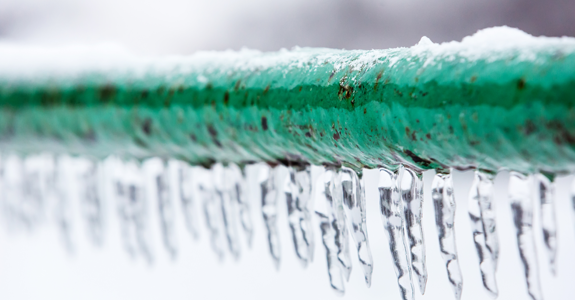How to Prevent Your Pipes from Freezing


As soon as the temperature dips below 32°F, your home’s pipes are at risk of freezing. The lower the temperature goes, and the longer it remains there, the higher the likelihood your plumbing will be impacted.
Some pipes in your home are more vulnerable to freezing than others, like the ones located in your basement, attic, or garage, which are generally unheated spaces. However, pipes running through cabinets or exterior walls are also susceptible to freezing. If these home pipes have not been properly protected and winterized when temperatures plummet, they can get so cold that the water flowing through them turns to ice. The following warning signs may indicate you have a frozen pipe:
If you notice any of these or other similar symptoms, do not try to thaw a frozen pipe yourself as doing so might cause further damage to your plumbing or result in an injury. Instead, reach out to a licensed plumber for assistance.
Unfortunately, frozen pipes often go undetected by a homeowner. If that happens, the ice in the pipe may continue to expand, exerting tremendous pressure on their plumbing. Over the course of just a few days (or less), this pressure may build to the point that the pipe ruptures, sending a cascade of water into the home and causing thousands of dollars in damage.
To avoid this costly and stressful situation, homeowners may want to implement these four preventive measures:
If a house pipe still ends up freezing and bursting, the most important thing to do is shut off the main water supply to your home. After that, you should contact a licensed, insured plumber for further instructions and stop using the plumbing system until a professional has a chance to evaluate it. In addition, if the burst pipe has damaged your property or belongings, reach out to your independent insurance agent right away for help initiating the claims process.
Sometimes homeowners wait until a water emergency occurs to track down the location of their home’s main water shutoff valve. We encourage you to look for it today. Some of the typical places it might be found are in the basement, a crawl space, an attached garage, or the utility or water heater room, or near the water meter or where the main water line enters your house. Being able to get to this valve quickly, and knowing how to operate it properly, can help minimize the damage a burst pipe can cause to your property.
For greater peace of mind, though, you may want to consider investing in a smart water shutoff valve. This device is installed on your main water supply line and constantly monitors the water flow and usage in your home. If it detects a change in pressure, a leak, or freezing temperatures, it alerts you, typically through an app. Plus, when it senses any abnormal activity, it can automatically shut off the water supply to your pipes and fixtures, helping to lessen the potential for damage to your home and belongings.
Please check out our blog for more insights on protecting your valuable property, not just when winter weather threatens but throughout the year. You will find tips on protecting your home from fire, water damage, theft, ice dams, and more.
Get all the facts shared in this blog in our complimentary, downloadable information sheet. Please feel free to share it with other homeowners who may want to know why pipes freeze and burst, the warning signs that pipes might be frozen, how to better protect pipes from cold temperatures, and more.
Download The Info SheetClick on the Find an Agent button to search for independent insurance agencies near you.
Contact the independent insurance agency you would like to work with by phone or email.
Leave it up to your agent to uncover the best coverage solutions for your valuable property.